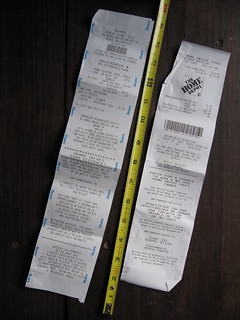Back in February, our staff adopted a Sustainability Initiative for 2013. Each quarter, we're taking a new step to reduce our carbon footprint, our toxics exposure and/or cost efficiency.
Last quarter, we started using cloth napkins and dish towels in our restroom and kitchen. Not only are we saving money by ditching paper products, but we're also reducing the amount of trash we send to the landfill. That's a win-win situation for our budget and the environment!
For the second quarter of this year, wanted to reinstate our composting program. For almost two years, vermicomposted at Toxic Free NC, but we recently let our worms retire to a colleague's urban farm.
We really miss having the option to compost at work. But after hearing Dr. Pete Meyers give an inspiring guest lecture at Catawba College about endocrine disruptors and their effect on our health and environment, we were motivated to shift our focus.
 |
| Too-Long Receipts by herzogbr on Flickr |
BPA, or Bisphenol-A, is an endocrine disrupting chemical that interferes with how the endocrine system controls hormones in the body. Even small exposures to endocrine disruptors can be linked to a host of health problems such as developmental defects, reproductive problems and certain types of cancer.
We're amending our accounting and reimbursement procedures to limit our exposure to the BPA-laden thermal paper found in receipts from gas pumps, restaurants, packing slips, etc.
From now on, our staff can snap a photo of a receipt instead of submitting the receipt with a paper expense report. And we can submit that documentation via email, which will drastically reduce the amount of paper we use in our record keeping.
Accepting photo receipts will limit our own individual exposure to BPA as we handle and store receipts for office expenses, and it will lessen the amount of BPA in public currency that gets transferred from receipts to the dollar bills we all carry in our wallets.
We hope that one small change in procedure will make a big difference!
If you keep financial files at home or in your place of work, do you have tips for ways that you make your record keeping more sustainable?

No comments:
Post a Comment